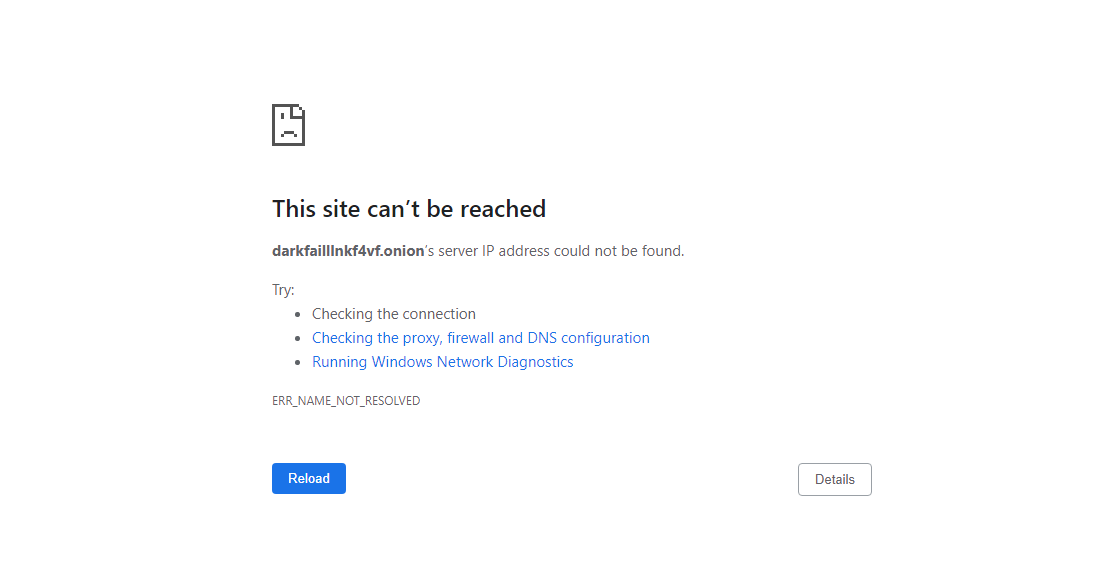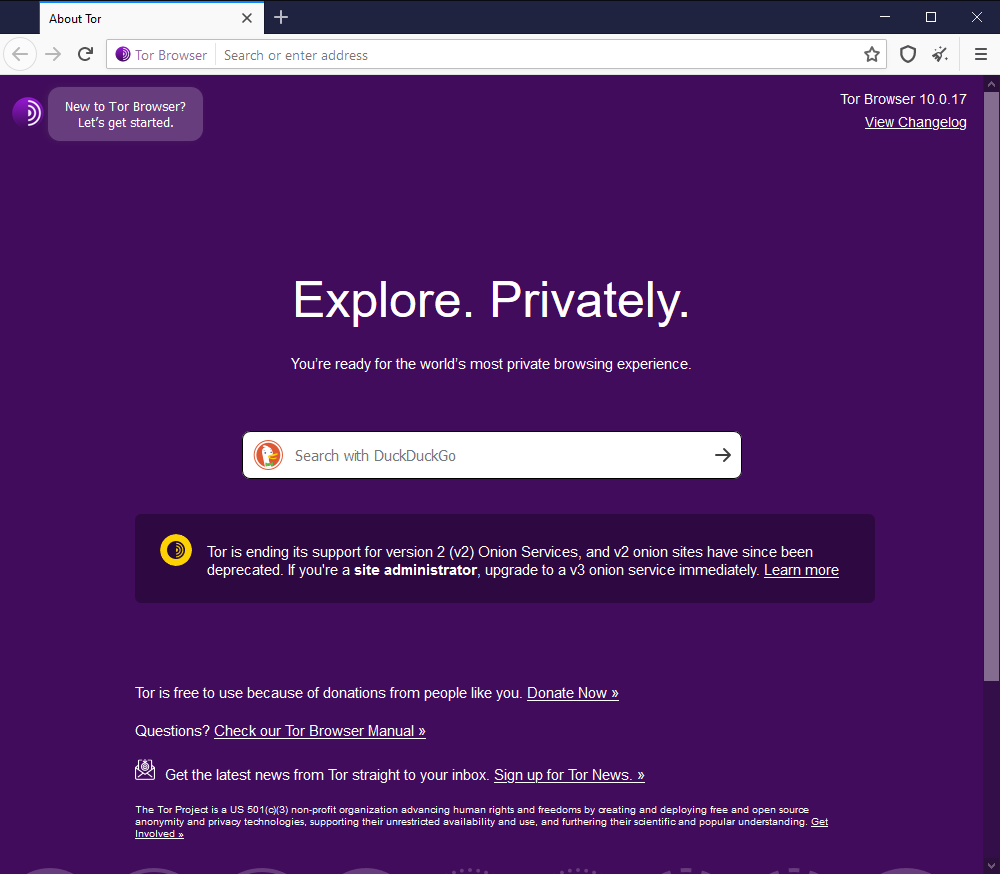The dark web is a subsection of the internet. The name "dark web" conjures up all kinds of ideas. Is it dangerous? Do criminals lurk there? What might you find on the dark web?
They are all excellent questions. So what is the dark web?
What Is the Dark Web?
The dark web is a subsection of the internet not indexed by regular search engines. You can only access the dark web using specialized software, such as the Tor Browser.
That's because the dark web requires your browser to use specific security and privacy configurations that can communicate with the network of anonymous websites on their anonymous hosts.
The dark web carries a notorious reputation as the haven of criminals, terrorists, nefarious sites, and everything in-between. In truth, it is a mixture of many things with a healthy sprinkling of myth and legend.
Are the Dark Web and Deep Web the Same?
The dark web is not the deep web.
The dark web is a series of anonymous websites. The deep web refers to other sites whose contents are not indexed by search engines.
For instance, your online banking portal is part of the deep web, not the dark web. Another example is the Wayback Machine. The Wayback Machine accesses cached images of sites found on the deep web.
Other examples are academic databases, legal documents, scientific reports, medical records, and so on.
What Is the Black Web?
The black web has nothing to do with the dark web or the deep web. It is a term that is sometimes confused with the dark web, but in reality, it isn't widely used or even acknowledged as an alternative.
How Does the Dark Web Work?
The dark web (also sometimes referred to as a darknet) is an overlay network. That means it is a network on top of a network. You can only access dark websites using special software.
The majority of people use the Tor network to access darknet websites. Tor stands for The Onion Router. Just as an onion has many layers, as does the Tor network. When you download the Tor Browser, you can access a whole new world of websites that use the .onion domain.
Onion sites don't use the regular DNS system that the "clearnet" (that's the regular internet) uses. Usually, when you type a URL into your address bar and hit Enter, your browser looks up the DNS address of the URL and takes you there. If you try that with an onion domain in a regular browser, you'll go nowhere (except an error screen).
Another key difference is how the darknet processes your data and your route across the internet to a hosting server. The structure of the darknet is meant to keep the sites, services, and users anonymous. When you use Tor to access the darknet, your internet traffic moves through several anonymous nodes from your computer to the onion site you want to visit.
Darknet vs. Dark Web: What's the Difference?
Typically, darknet refers to the network you access to find so-called deep websites. So, in the above examples, the Tor network is the darknet, and the onion sites you visit are the dark web.
Is the Dark Web Illegal?
The dark web isn't illegal. That's because it is just a network of anonymized servers. However, the legality of accessing dark web content or a darknet itself depends on your jurisdiction.
Most people use the Tor Browser to access the dark web. The Tor network uses strong encryption to protect users and their data. Therefore, anywhere where strong encryption is illegal, accessing the Tor network is illegal by extension.
In China, using strong encryption is illegal; therefore, using the Tor network is a criminal activity. Furthermore, the Chinese government banned the use of VPNs (virtual private networks) in 2017. However, millions of citizens still use the banned tech to access censored content and networks outside the Chinese firewall.
Russian citizens face similar issues, as do Belarussians, Iranians, Turks, and many others.
Is There Illegal Content on the Dark Web?
That's an important distinction. The dark web itself isn't illegal. Websites on the dark web host illegal content of all kinds. Moreover, authorities struggle to restrict illegal content because of the dark web structure. If each website and node within the network remains secure, tracking down the owner of a specific site becomes incredibly difficult.
Taking down illegal content found on the dark web is made even harder with the use of servers in countries with lax or indifferent attitudes to internet security and censorship. If someone wants to host a website on the dark web while remaining anonymous, they can use "bulletproof hosting" providers.
Bulletproof hosting providers turn a blind eye to criminal activities taking place on their servers. The idea is that when the authorities do eventually track the server owner and location down, nothing is traced back to the website owners. The buck stops with the bulletproof host, and the website owners move on without issue.
The majority of bulletproof hosting services are now found in places with questionable law enforcement. That hasn't always been the case, though. For example, at one time, San Jose-based McColo was the largest bulletproof hosting provider in the world.
Is there illegal content on the dark web? Yes, absolutely. Will you bump into those things immediately? No. Well, maybe. But only if you're seeking it out.
How to Get on the Dark Web
The easiest way to access the dark web is using the Tor Browser. The Tor Browser is a modified Mozilla Firefox browser that uses Torbutton, TorLauncher, NoScript, and HTTPS-Everywhere.
- Head to the official Tor Project. Only download the Tor Browser from this site. Select the Download Tor Browser button, wait for it to download, then install.
- Once installed, open the Tor Browser. If the browser informs you about an update, install it immediately.
- You should now see the New to Tor Browser welcome message. It contains some handy tips, so give it a read if it's your first time.
Here is another tip: Don't mess around with the Tor Browser security settings. Unless you know what you are doing, you could inadvertently expose yourself, negating the effect of the Tor network.
How to Setup a Tor Bridge
While the above tip is accurate, there is an exception to that rule. In countries where Tor access is heavily restricted or even illegal, you can use a Tor bridge connection to access the dark web.
This article won't go into detail about setting a Tor bridge up, but you can read the full Tor bridge documentation for a proper guide.
Should You Use a VPN on the Dark Web?
In a word, Yes. You should always use a VPN when connecting to the dark web. Heck, these days, you should use a VPN most of the time when you're online. A VPN protects your data and gives you an additional security boost while online.
When you access the Tor network, everything within your Tor Browser is encrypted. It does not encrypt anything else. Your internet activity outside the Tor Browser isn't secured using the Tor network. That's where a VPN comes in handy, though it is by no means foolproof.
If you're looking for a great VPN—one that I use myself—look no further than Private Internet Access. Use the link to get yourself a massive discount!
It is important to note, though, that the VPN doesn't change your activity within the Tor network or on the dark web. Using a VPN protects your traffic when you leave the Tor network through what is known as an exit node. It is possible to set a VPN up within Tor, and there are several different Tor VPN configurations available.
The Dark Web Isn't Scary
The Dark Web isn't scary. It has a bad reputation. There are a whole host of darknet sites you can visit for entirely legitimate reasons. Just remember to consider the legality of accessing the dark web depends on where you live, and take proper precautions before getting on the dark web.



